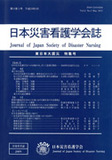Japanese
English
- 有料閲覧
- Abstract 文献概要
- 参考文献 Reference
- サイト内被引用 Cited by
要約
【研究目的】災害支援活動を行った看護職者の災害支援活動後の心身の変調について明らかにすることである。
【研究方法】2009年6月、新潟県の自然災害被災地域に勤務する看護師、保健師等の702人を対象に、自記式質問紙郵送調査を実施した。調査項目は、属性(性、年齢、職種等)、被災および支援活動の状況、IES-R、支援者ストレスのチェックリスト等である。
【結果】有効回答数438(有効回答率62.4%)であった。
IES-Rで心的外傷性ストレス症状の高危険者とされる25ポイント以上の人は、31人(7.0%)であり、高危険者の96.8%は自身が被災した看護職であった。IES-R得点の関連要因としては、「自宅が全壊」「家族の健康不良」「家族の健康状態の悪化」「自分の体調がよくなかった」「避難所生活をした」者に高かった。
【結論】支援活動が予想を超える活動である場合や、活動後の気持ちに否定的な変化があった場合には、看護職者の心身に対するケアの必要性が示唆された。
Abstract
Aim:The purpose of this study is to clarify any physically or mentally abnormal conditions reported by nurses who worked in disaster relief and support.
Method:A self-administered questionnaire postal mail survey was conducted in June 2009 on 702 nurses and community health nurses who worked providing support in a disaster area in Niigata Prefecture. Survey items included demographic details(gender, age, job classification), details pertaining to situations of suffering encountered and support activities undertaken, IESR, checklists of supporter's stress.etc.
Results:The number of valid responses was 438(62.4% valid response rate). A total of 31(7%) respondents had an IES-R score over 25 points, a level considered to be high risk for posttraumatic stress disorder. A total of 96.8% of those nurses reported having been hit by the disaster themselves. IES-R values were particularly high in respondents who reported circumstances such as "my house was completely destroyed," "my family is unwell," "deteriorated health of family members," "not feeling well myself," or "living in an evacuation center." Conclusion:The survey's findings suggest the need for both mental and physical care for nurses in situations where the amount of support that nurses provide exceeds the expected level, or in cases where nurses exhibit post-activity negative changes in feelings.
Copyright © 2011, Japan Society of Disaster Nursing All rights reserved.


